Andrei Sannikov: Lukashenka’s regime is out of date and won’t live long
33- 21.08.2009, 15:09
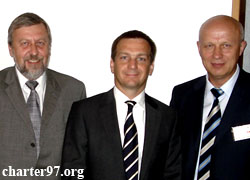
Andrei Sannikov, the leader of the civil campaign “European Belarus”, and former political prisoner Alyaksandr Kazulin took part in the celebration of the 20th anniversary of the Pan-European Picnic and had meetings with the leading European politics.
The Pan-European Picnic was a peace demonstration held on the Austrian-Hungarian border near the town of Sopron on 19 August 1989. In a symbolic gesture agreed to by Austria and Hungary, a border gate on the old Bratislava road was to be opened for three hours.
About 600 East Germans seized the opportunity presented by this brief lifting of the Iron Curtain, and fled into the west. The Hungarian border guards, however, didn’t stop them in spite of the arrangements between Eastern Germany and Hungary not to allow eastern Germans in a non-socialistic state. The Pan-European Picnic is considered a highly significant milestone in the efforts that led to the German reunification after ten WWII, the end of the Cold War, and the fall of the Iron Curtain.
President of Hungary László Sólyom, Chancellor of Germany Angela Merkel, Prime Minister of Hungary Gordon Bajnai, Minister of Foreign Affairs of Sweden, the country holding the EU presidency, Carl Bildt, and direct participants of the 20-year-old event, Hungarian and GDR border guards, famous politicians and European diplomats.
– It is considered that the Iron Curtain was breached for the first time near Hungarian Sopron 20 years ago. The events developed rapidly. The Berlin Wall fell two months later, in October,” Andrei Sannikov tells in an interview to www.charter97.org. “The Pan-European Picnic is a historical event that demonstrated the power of civil society. In 1989, common Hungarian citizens answered the call of the organizers and came to the border to ensure safety of the eastern Germans who wanted to flee to West. Though the Hungarian border guards were ordered to shoot to kill anyone who attempted to cross the border, they didn’t make shots.
German Chancellor Angela Merkel told an interesting fact in her speech in Sopron. Foreign Minister of the Federal Republic of Germany Hans Dieter Genscher phoned Hungarian Prime Minister Zsolt Németh and asked how Germany could thank Hungary for the help in that difficult situation. The Hungarian head of that time said: “We don’t need anything, we don’t trade with people.”
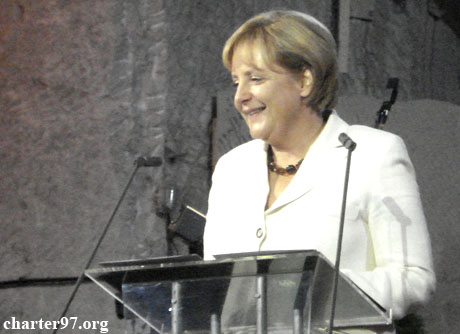
Chancellor of Germany Angela Merkel
Belarus is the only post-Soviet country whose representatives were invited for the celebration of the 20th anniversary of the Pan-European Picnic. Andrei Sannikov and Alyaksandr Kazulin arrived in Sopron on the invitation of the International Centre for Democratic Transition (ICDT).
– Our presence in Sopron was symbolic, because we represented the country lying outside free Europe. Through the efforts of Lukashenka Belarus is divided from the natural European region and the Belarusians still live under conditions reminding the socialist camp,” Sannikov thinks.
In his view, “existence of dictatorial Belarus on the border with free Europe is absurdity that will see its end soon.”
– The recent extremely nervous and aggressive statements by Lukashenka about the European Union mean that the outdated regime won’t live long. The people of Belarus should feel: we are able to change life for better as people of Eastern European countries, including Hungary, have done,” the politician thinks.
Andrei Sannikov and Alyaksandr Kazulin had a range of import6ant political meetings with Prime Minister of Hungary Gordon Bajnai, Foreign Minister of Sweden Carl Bildt, head of the parliamentary fraction of the Hungarian Democratic Forum Herényi Károly, and head of the Parliamentary Foreign Affairs Zsold Németh.
–Prime Minister Gordon Bajnai wanted to know how Hungary could help Belarusian democrats and civil society. Hungary holds the Visegrad Group’s presidency and will hold the presidency of the European Union in 2011. The prime minister noted that Hungary’s role was important for Belarus, as the country’s position on our situation would influence the general European policy. Bajnai promised to raise the touched questions at his meetings with European leaders who had come to the Pan-European Picnic. He also noted that the event, we had been invited for, was significant for freedom fighters. In his view, events in Hungary in 1989 can serve as an example for Belarus,” Andrei Sannikov told.
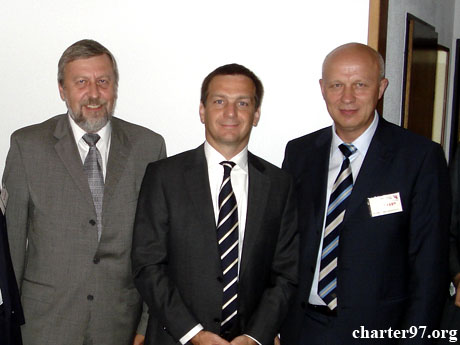
Andrei Sannikov, Gordon Bajnai, and Alyaksandr Kazulin
According to the politician, the meeting with Swedish Prime Minister Carl Bildt was “highly important”.
– Sweden holds the EU presidency now and much depends on its understanding of the situation in Belarus. We told Carl Bildt what caused our concern, talked about necessity of more active cooperation between European politicians and Belarusian opposition and civil society. We talked about the regime of Lukashenka, whose intention to cooperate with Europe remains in word. The Swedish Foreign Minister noted that he watched the events in our country closely, he was well informed about the case of Mikalai Autukhovich and other political prisoners and raised those questions at meetings with officials representatives of Belarus. He thinks contacts with Belarusian officials can be useful if they begin to fulfil their promises. By the way, Sweden plans to invite a delegation of the Belarusian opposition and civil society in Stockholm in the nearest time,” the coordinator of “European Belarus” noted.
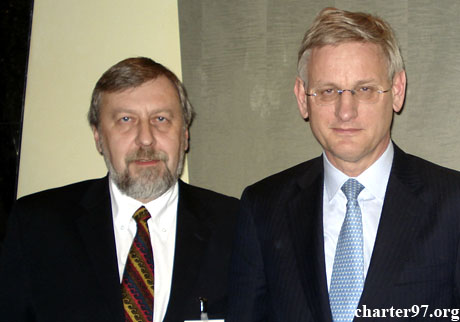
Andrei Sannikov and Carl Bildt (a photo from archive)
Andrei Sannikov and Alyaksandr Kazulin discussed the issue of political prisoners at talks with the head of the parliamentary fraction of the Hungarian Democratic Forum Herényi Károly.
–Solidarity of the heads of the European countries and all European politicians in defending human rights and democratic freedoms in Belarus is vital for us. The head of the fraction of the Hungarian Democratic Forum understands our situation well. He promised to pass our point of view to the international society through his party, which representatives work in international parliamentary institutions and in the European Parliament. He emphasized that the Hungarian Democratic Forum was interested in wider and more active cooperation with the Belarusian civil society,” Andrei Sannikov told.
The chairman of Foreign Affairs Committee and one of the Fidesz party founders Zsolt Németh promised the Belarusian democrats that he would introduce a document on the situation in Belarus for consideration by the Parliament of Hungary.
– We also talked about political repressions and political prisoners in Belarus at the meeting with Zsolt Németh. He expressed his interest in possibilities of real, not demonstrated, democratization in Belarus, in relations with Russia. By the way, at all meetings we reminded the European politicians that Lukashenka had ordered to prepare a draft law giving the heads of the KGB, Interior Ministry and the Financial Investigation Department the right for direct arrests of people. We emphasized that the draft law in fact changed the Constitution of the country,” the leader of “European Belarus” noted.
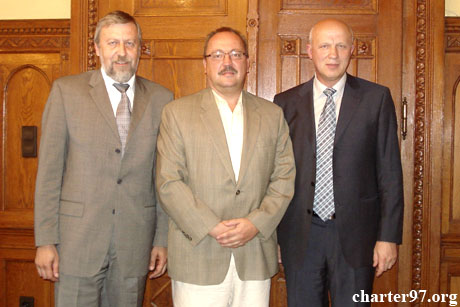
At a meeting with Zsolt Németh, the chairman of Foreign Affairs Committee in the Parliament of Hungary
Andrei Sannikov and Alyaksandr Kazulin held a press conference for journalists after their meetings with the leadership of Hungary and Sweden and gave interviews to the leading Hungarian newspapers – Nepsabadszag and Madyar Nemzet.










